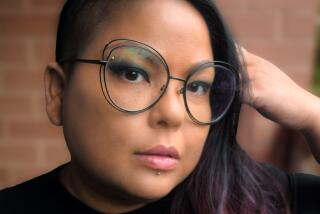Review: Jessa Crispin’s ‘Dead Ladies Project’ braids travelogue, literary criticism and emotional honesty
Jessa Crispin’s new book, “The Dead Ladies Project,” opens in the wake of a suicide threat. Two police officers stand in the author’s kitchen preparing to take her to the emergency room, and her immediate concern is to keep them from seeing that she’s been making macaroni and cheese from a box — a detail she finds vastly more shameful and self-exposing than the reason they’ve come to her home. And yet it soon becomes clear in this travel memoir-as-literary criticism, or vice versa, that the writer is committed not only to reclaiming her life but also to laying bare wincingly messy impulses and desires.
Crispin, who founded the literary website Bookslut, was living in Chicago at the time of this brutally low point, and the book chronicles her attempt to reconstitute her life by leaving it behind — not through self-harm but through acts of pilgrimage, retracing the steps of dead writers and artists in a hope of finding communion with “the unloosed, the wandering souls who were willing to scrape their lives clean and start again elsewhere.”
She begins with William James in Berlin. Along with her readings of the philosopher’s “Varieties of Religious Experience,” biographical anecdotes and a visit to the William James Center where she interviews the director, Crispin weaves in her own attempts to acclimate, ordering cocktails she doesn’t recognize, wiping out on the icy sidewalks and calling the city home “for now.” Other pairings include Rebecca West and Sarajevo, Igor Stravinsky and Lausanne, Claude Cahun and Jersey Island. Along the way, an unnamed lover, a novelist who lectures her on Hannibal and the Punic Wars, hovers at the edges.
Crispin’s writing is marked by a staccato, present-tense energy. After learning the lover is married and deciding not to question her role as mistress, she writes: “In return for my silence I get Rome. I get prosecco and grappa. I get little golden shoes the color of medieval gilding. I get the history of the world whispered to me in sacred places.”
Her approach to criticism has a boozy, gossipy, occasionally profane quality, and she treats her subjects with a slouchy irreverence, as in this delineation of gender performance in the chapter on Jean Rhys and London: “Hemingway in his I will simply open this blocked door by slamming my head into it repeatedly why not masculinity. Rhys in her can you please carry my bag and my other bag and my entire life I just can’t femininity.”
Try as the author might to feel affinity for the unloosed and the wandering, it doesn’t always happen. She gets impatient with Rhys’ passivity. She is disappointed with Rebecca West, finding West’s own travelogue, “Black Lamb and Grey Falcon,” overwritten. “If I were editing Black Lamb,” she writes, “I would ask Rebecca to question her assumptions. I would ask her to include doubt. I would cut many of her declarative sentences, particularly those that begin ‘Turks are...’ or ‘Muslims are...’ or ‘Serbs are... .’”
If I were editing “The Dead Ladies Project,” I would ask the author to cut the reliance on repetitive sentence structure, sustain a clear sense of the passage of time, leaven the analysis and feelings with uninflected detail, and I would say: Don’t hand a reviewer a set-up like that.
Glibness aside, there is a powerful, belligerent urgency animating Crispin’s quest: Can art save your life? The author takes admirable risks in exposing desperate interior states, but straightforward biographical details are hard to come by. Most information comes pre-packaged with emotion or interpretation, and as a result there isn’t much space for the reader to form his or her own impressions.
“When you are eight years old and in Kansas history class and they are trying to make you feel okay about coming out of a much-maligned region of America, because we all know that the coasts are where the important, intelligent people come from, they tell you about Amelia Earhart (but not the whole open marriage thing) and William Allen White (but not his progressive politics) and John Brown.” A sentence like this, with its length, multiple clauses and heightened sarcasm, builds to a formidable rage, but what I was glad to snatch out of all that momentum and feeling was the near-buried fact that the author grew up in Kansas.
These fire-hose sentences come in frequent succession. Less common is an unadorned line like this one about buying Kathy Acker’s “Pussycat Fever” when Crispin was 15: “I counted up money from my afterschool job at my father’s pharmacy and purchased a money order at the local credit union and mailed it.” Like macaroni and cheese from a box, it says so little and so much — about the texture of the author’s childhood, about a drive for a different life, about the absolute need for other voices — and what’s achingly clear is that the stakes have always been high.
Brown is the author of the forthcoming biography “Twilight Man: The Strange Life and Times of Harrison Post.”
::
The Dead Ladies Project: Exiles, Expats, and Ex-Countries
Jessa Crispin
University of Chicago Press, 256 pp., $16
More to Read
Sign up for our Book Club newsletter
Get the latest news, events and more from the Los Angeles Times Book Club, and help us get L.A. reading and talking.
You may occasionally receive promotional content from the Los Angeles Times.






